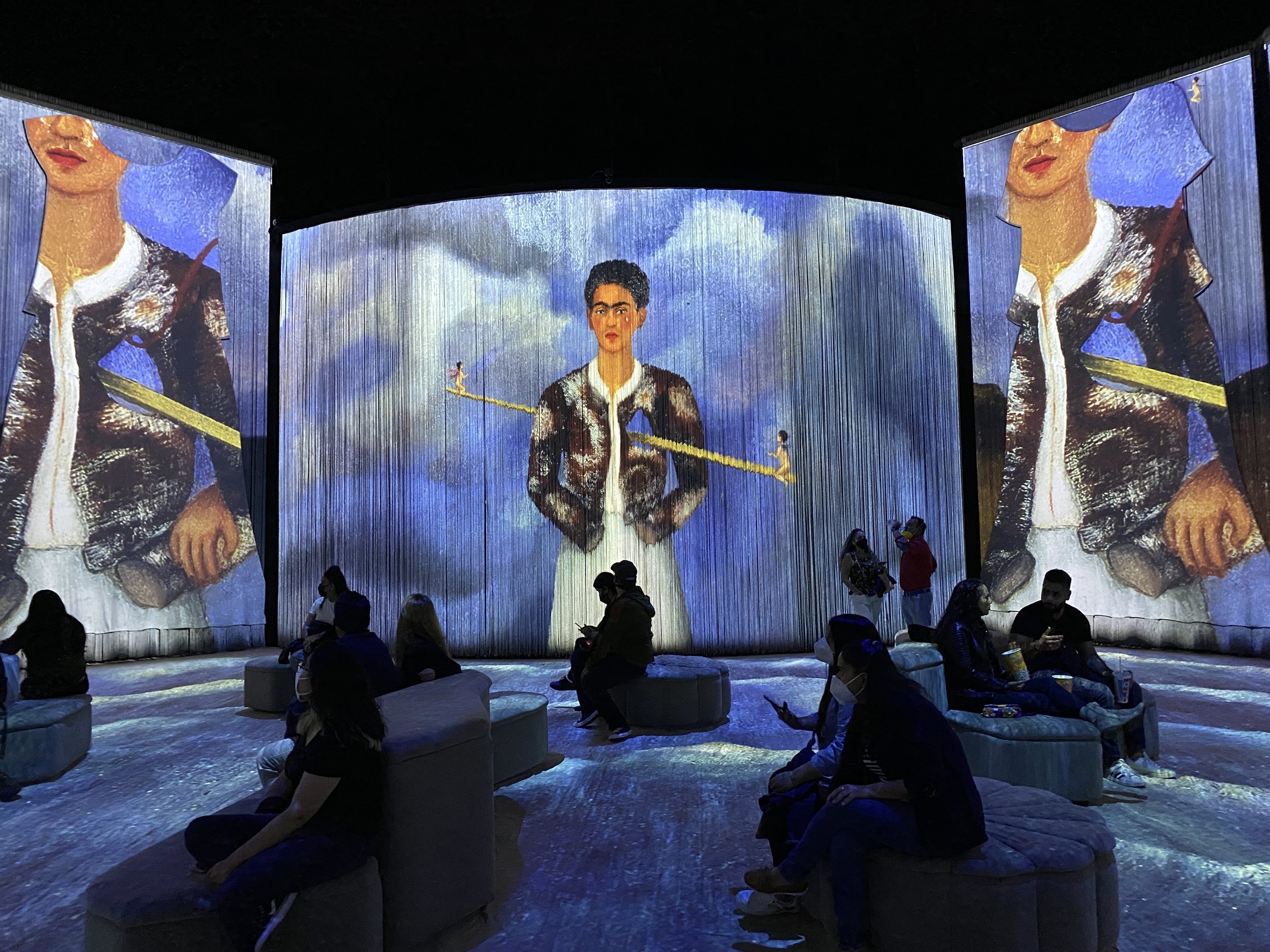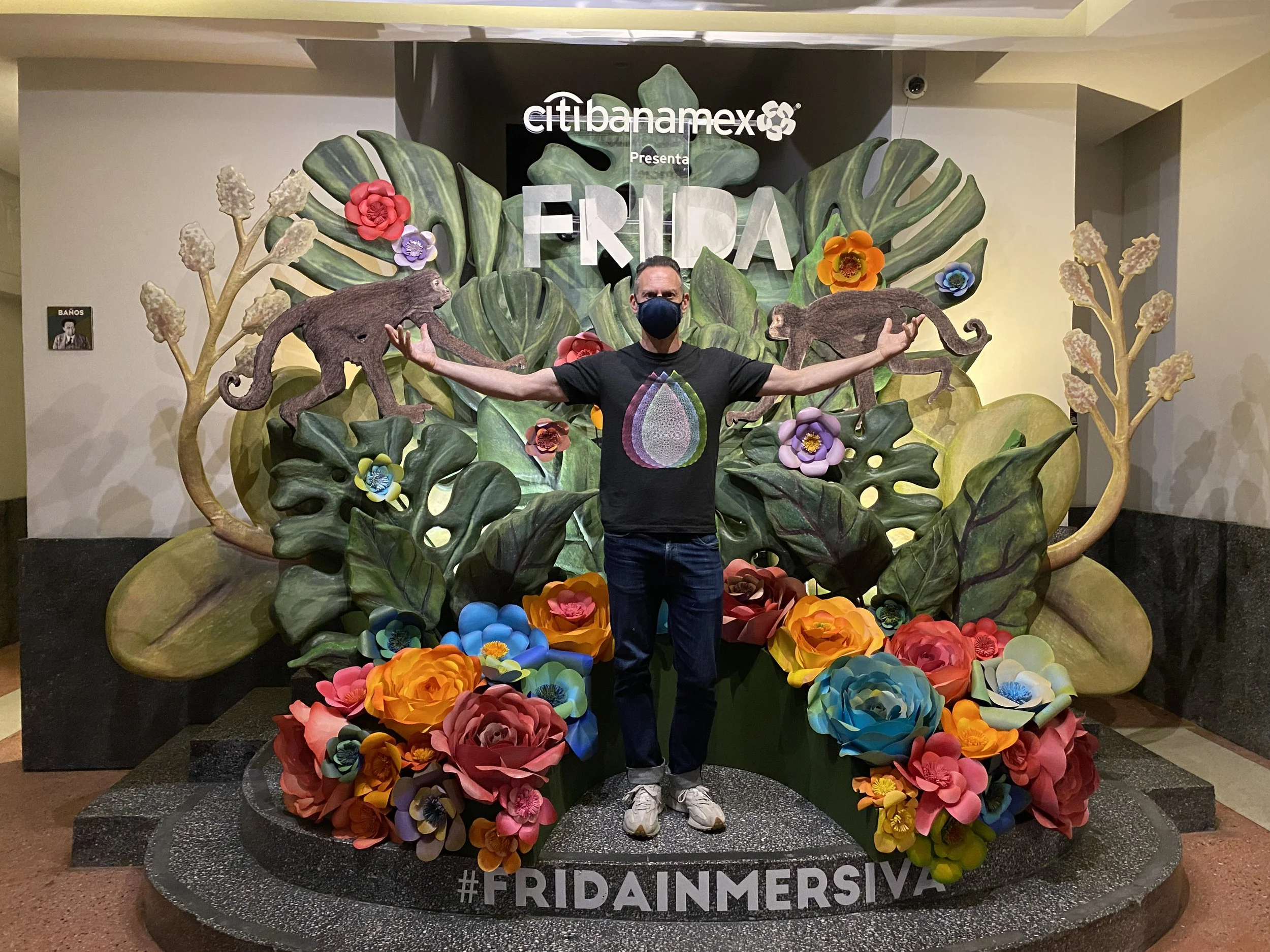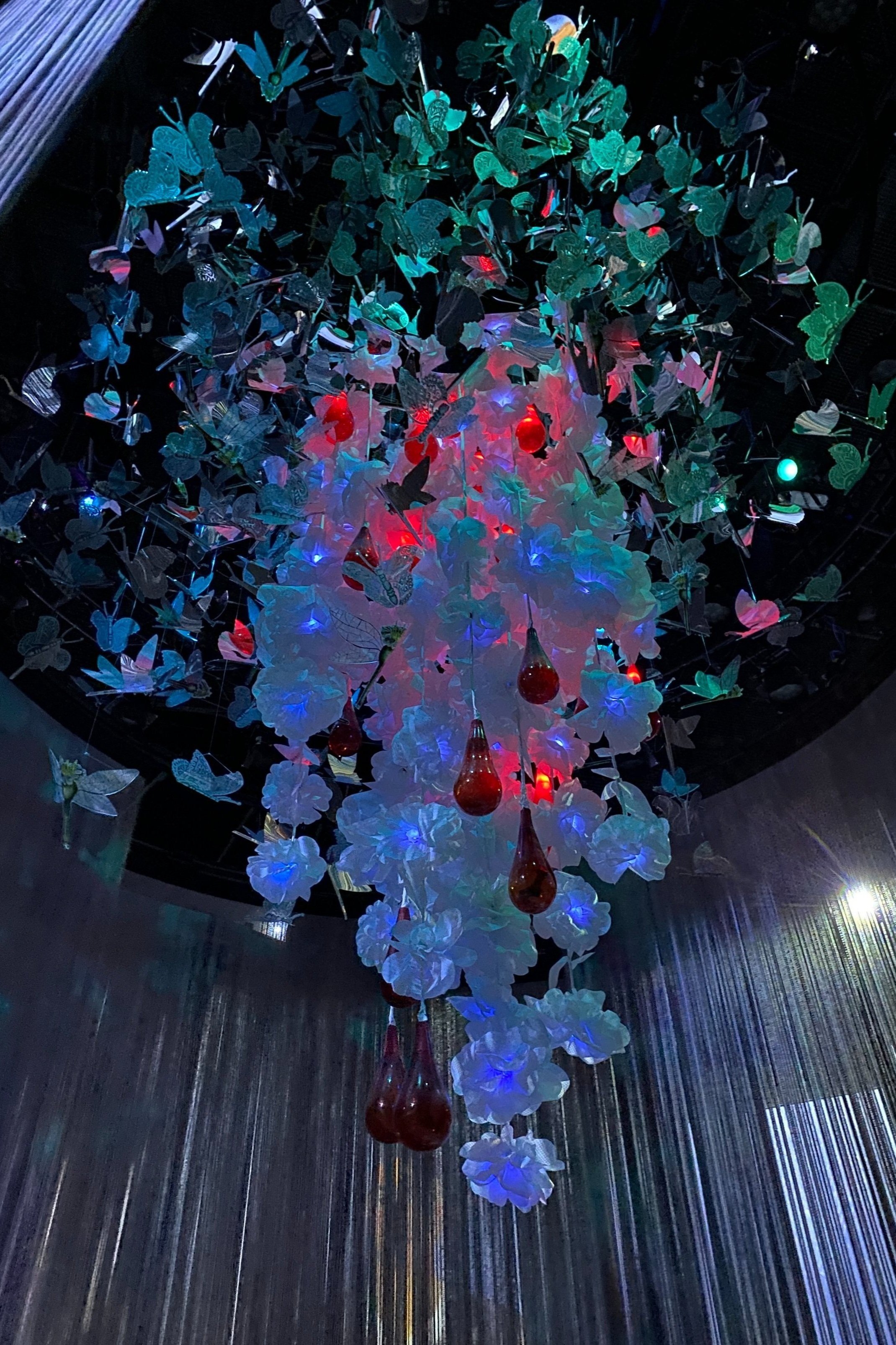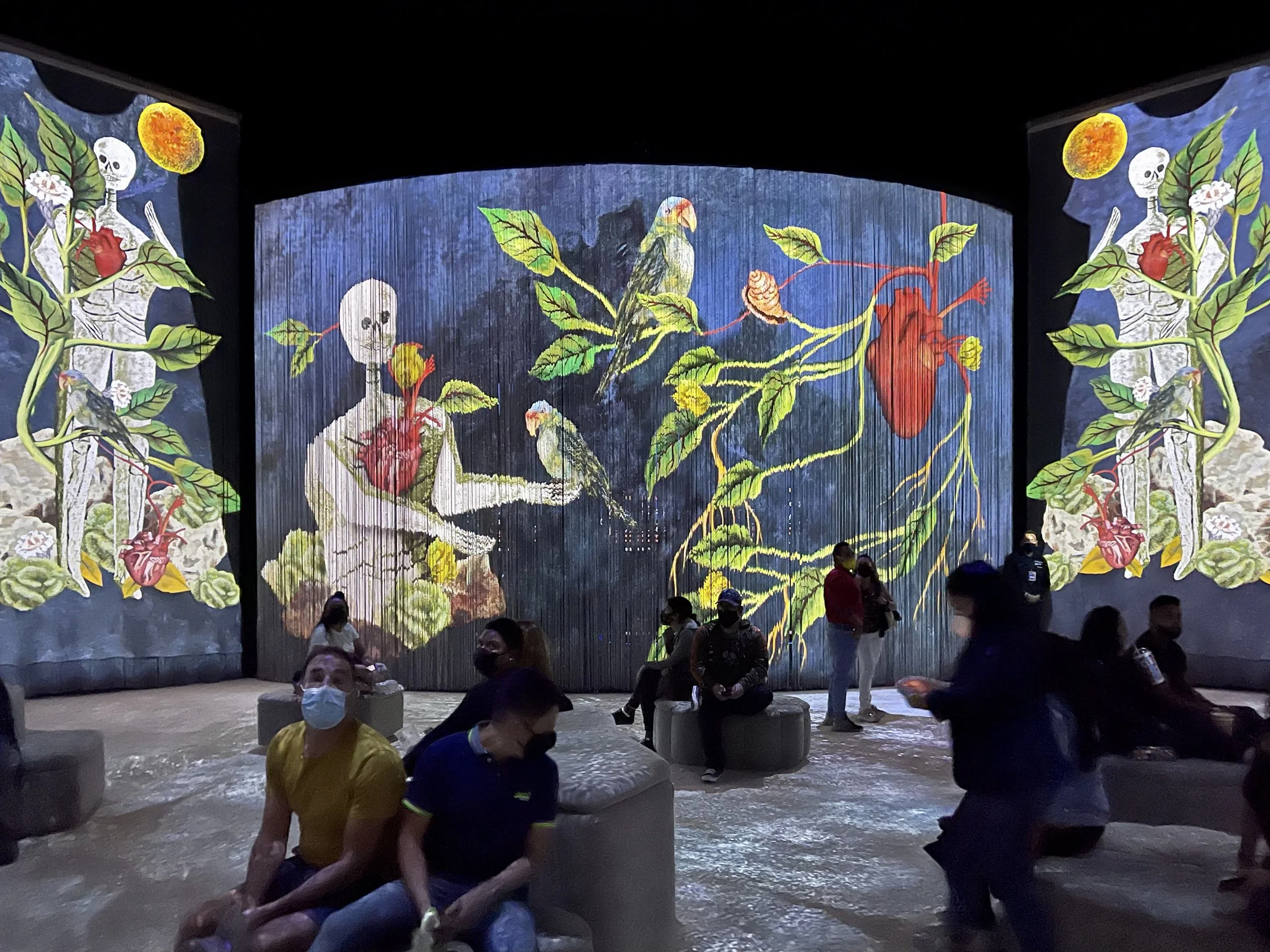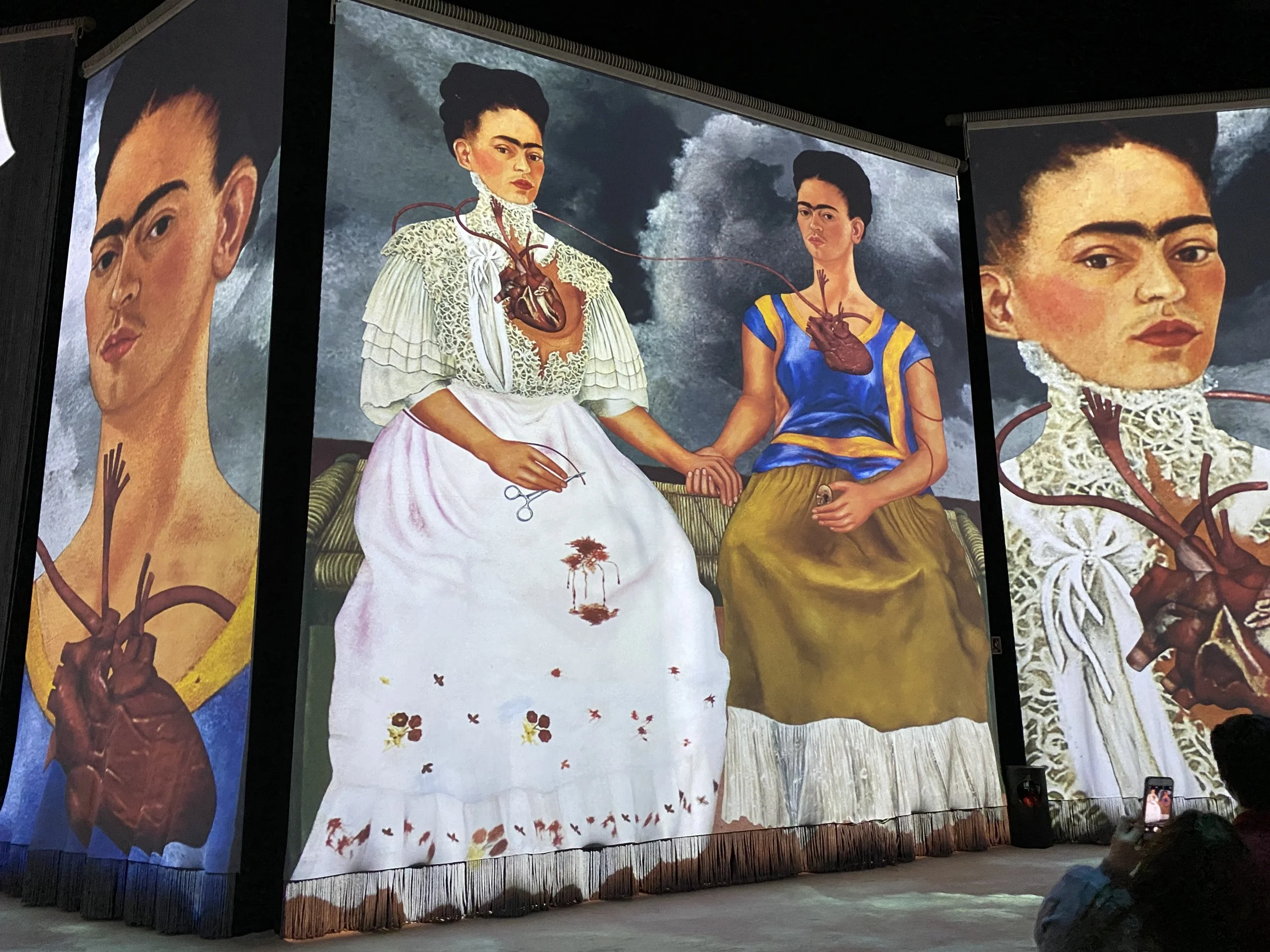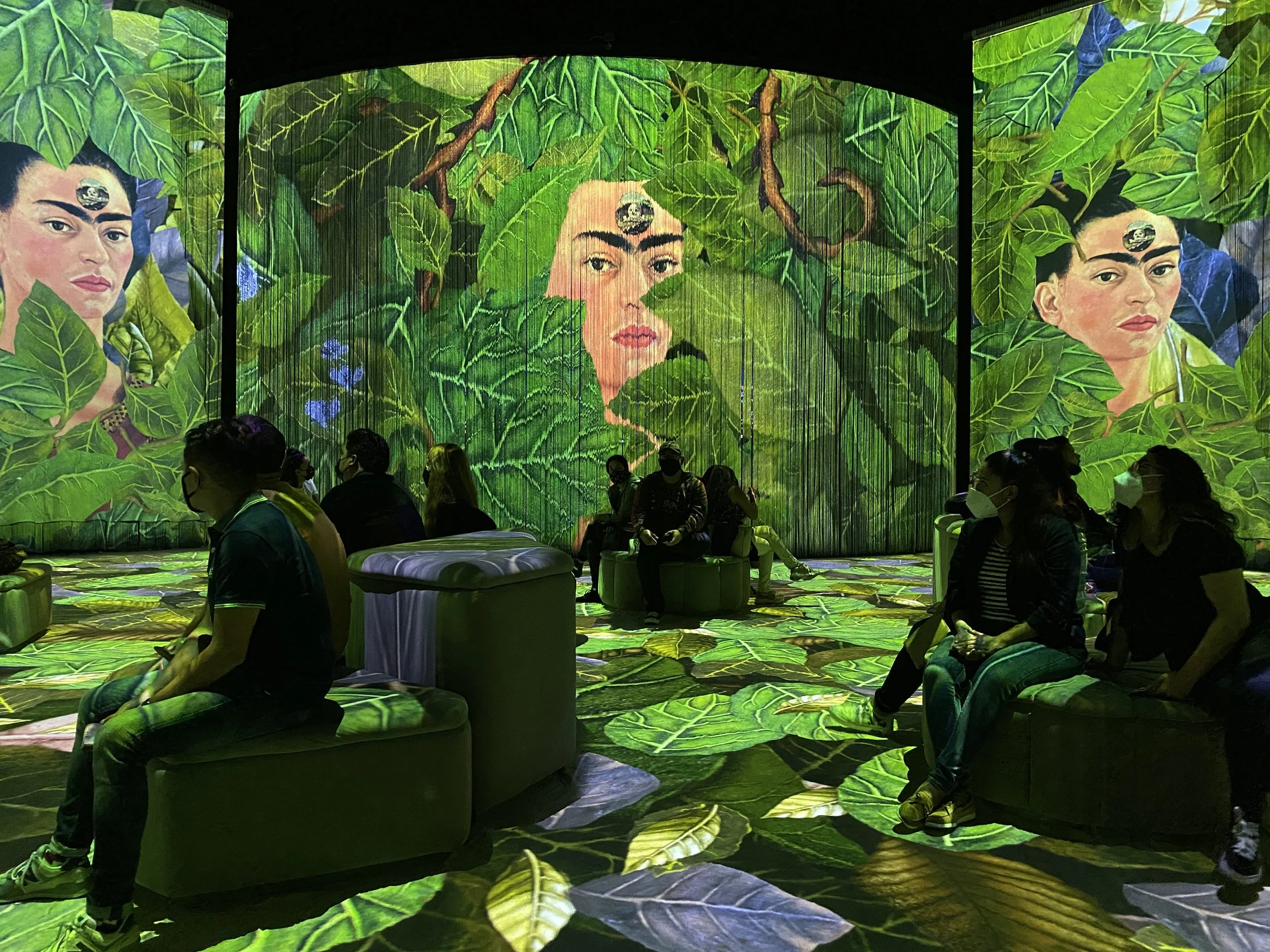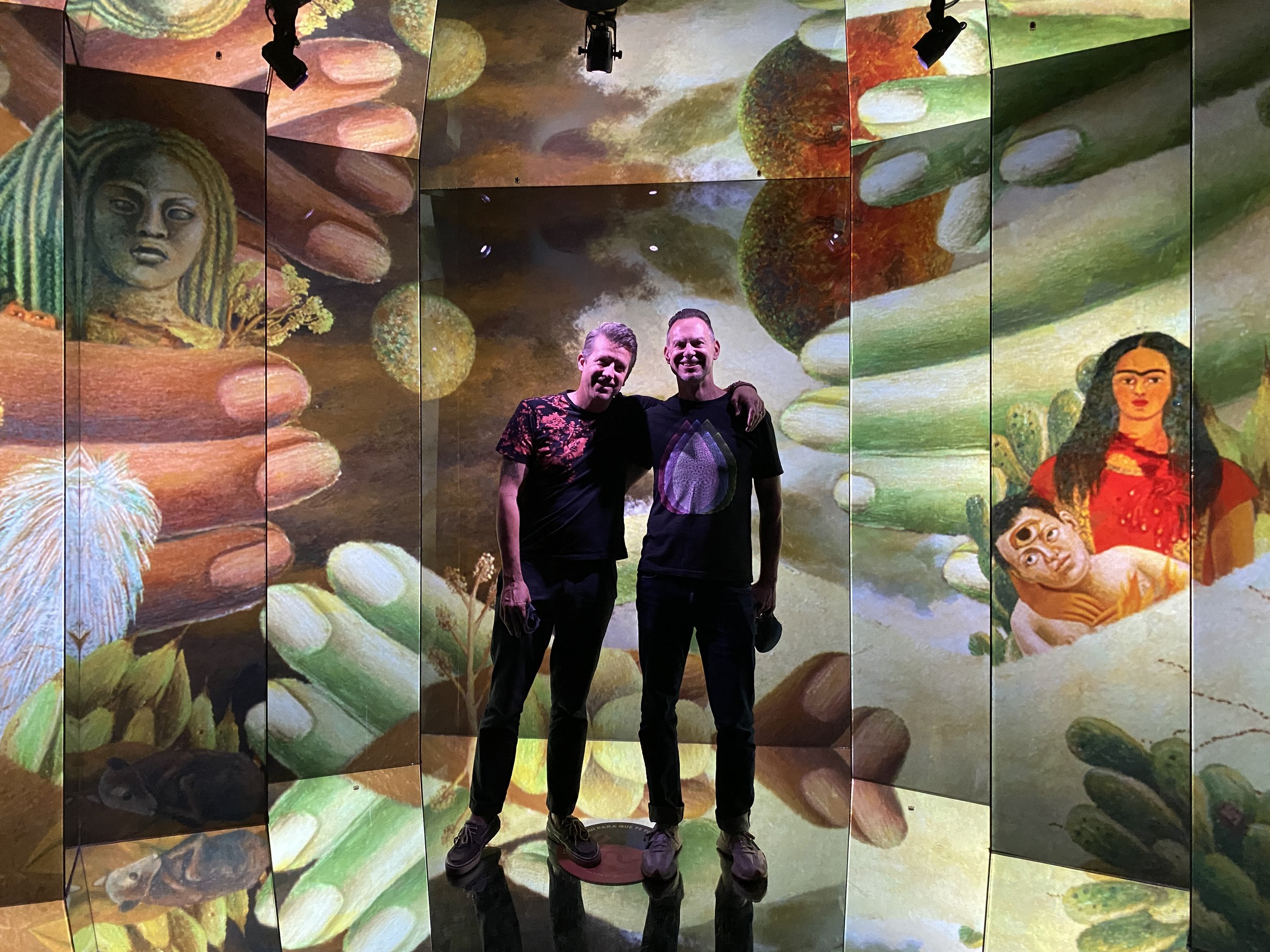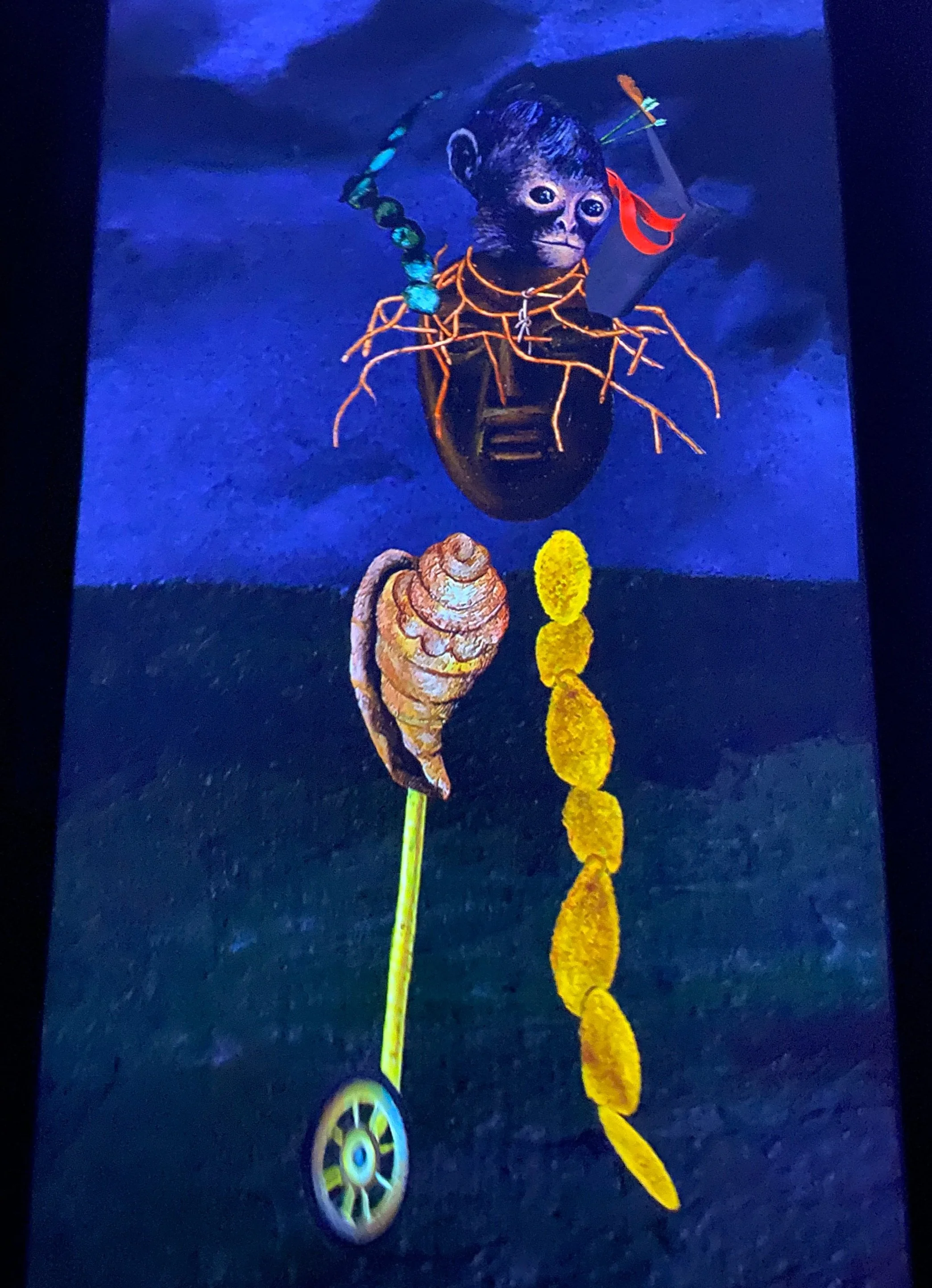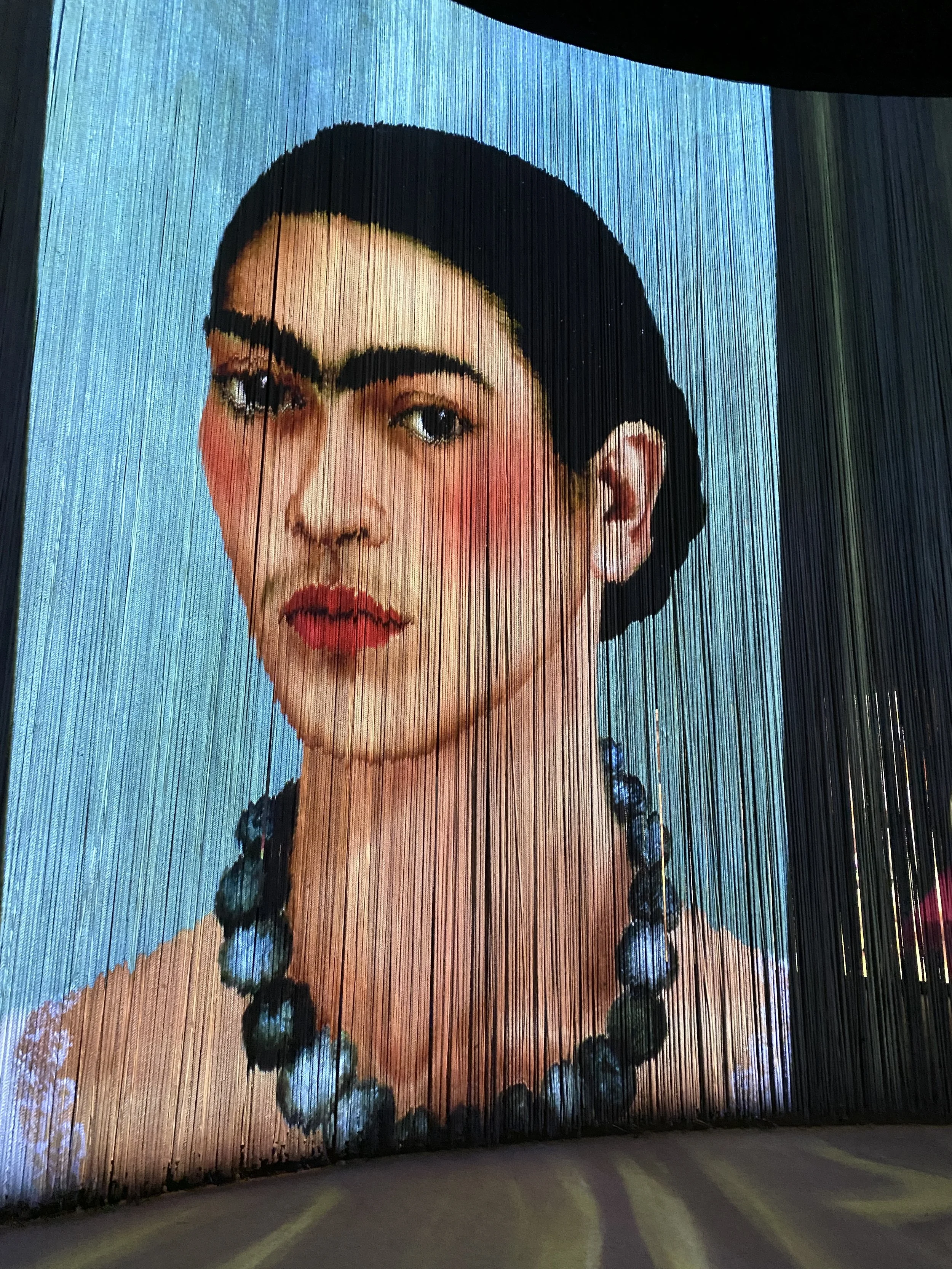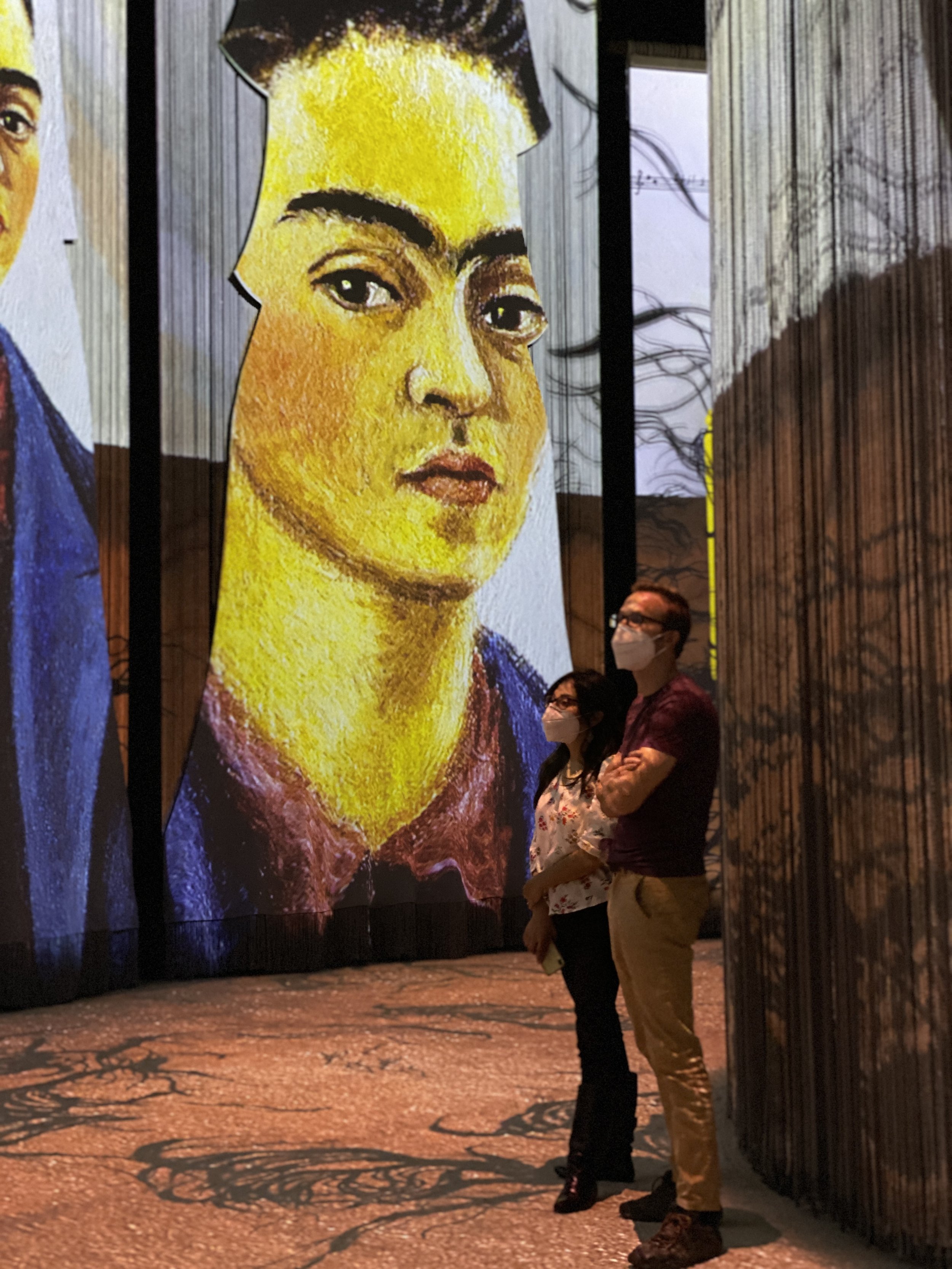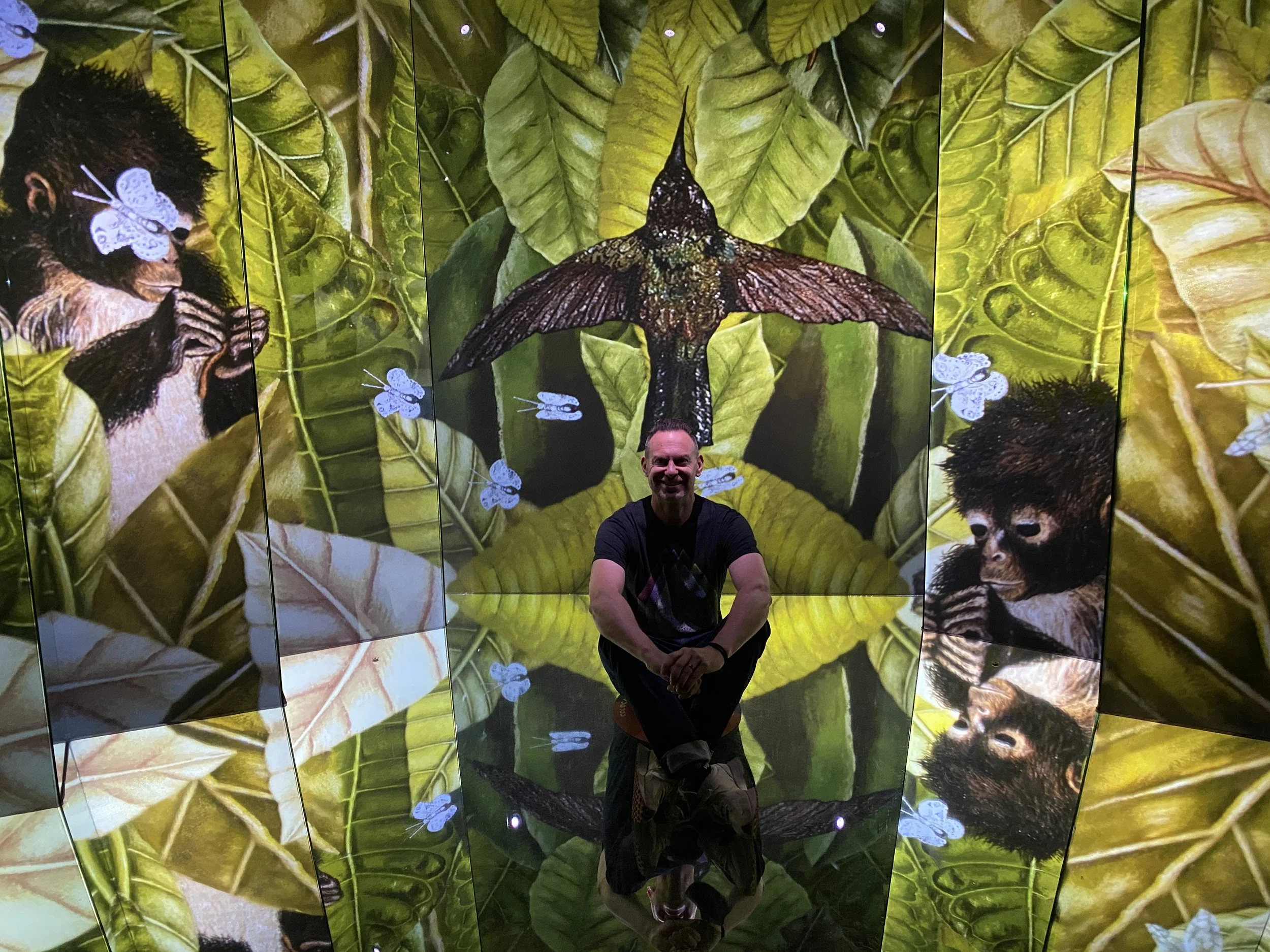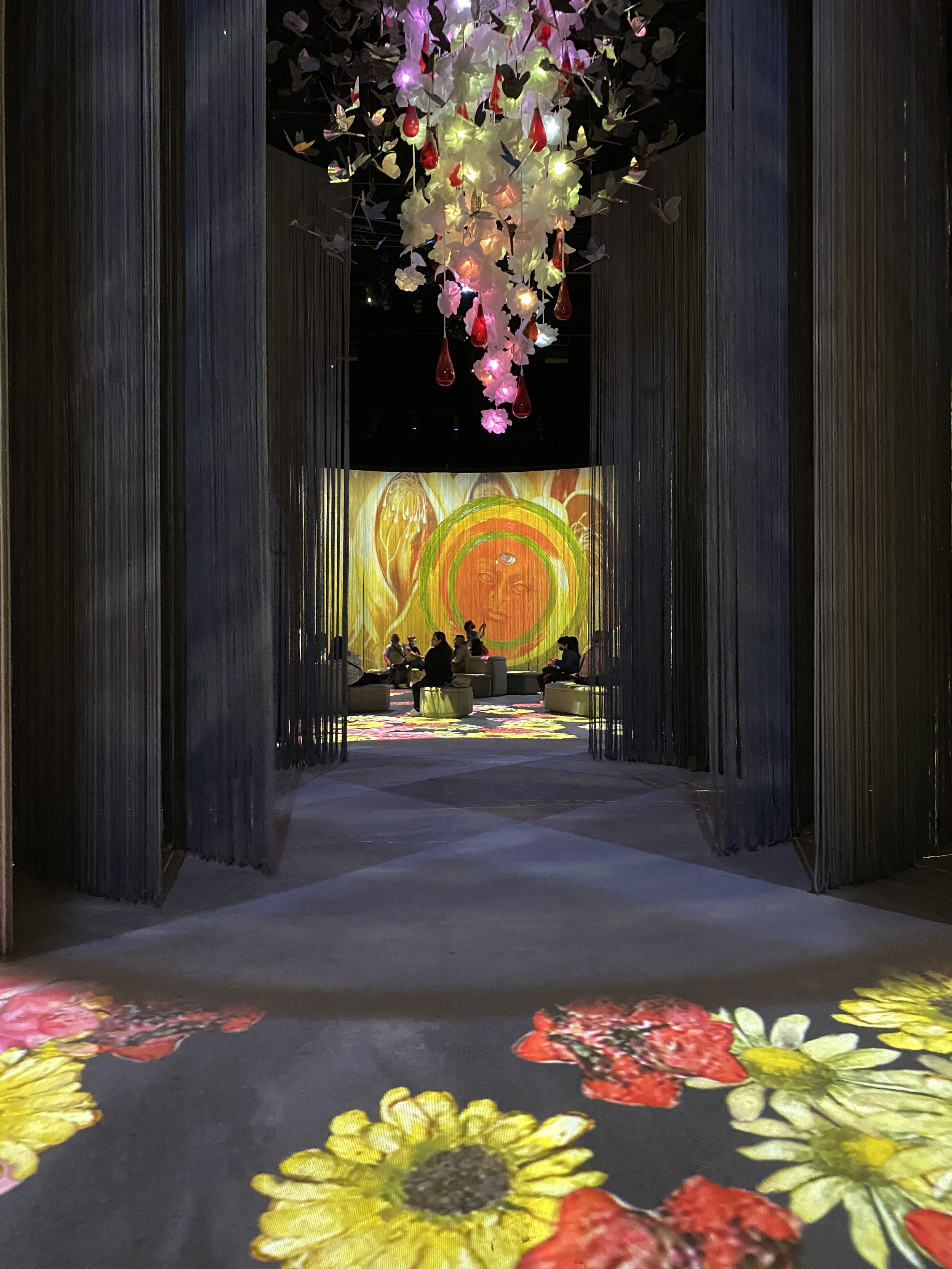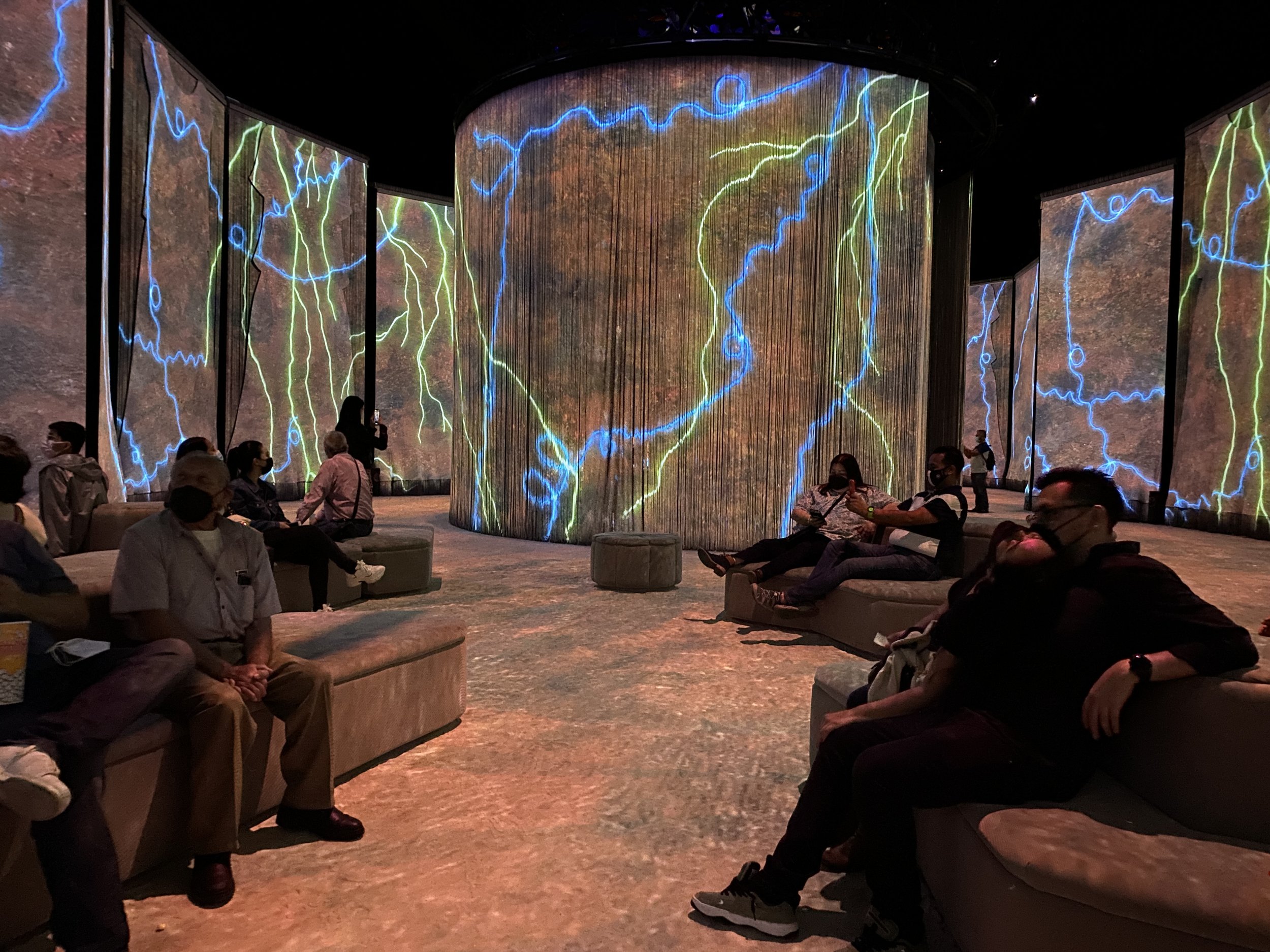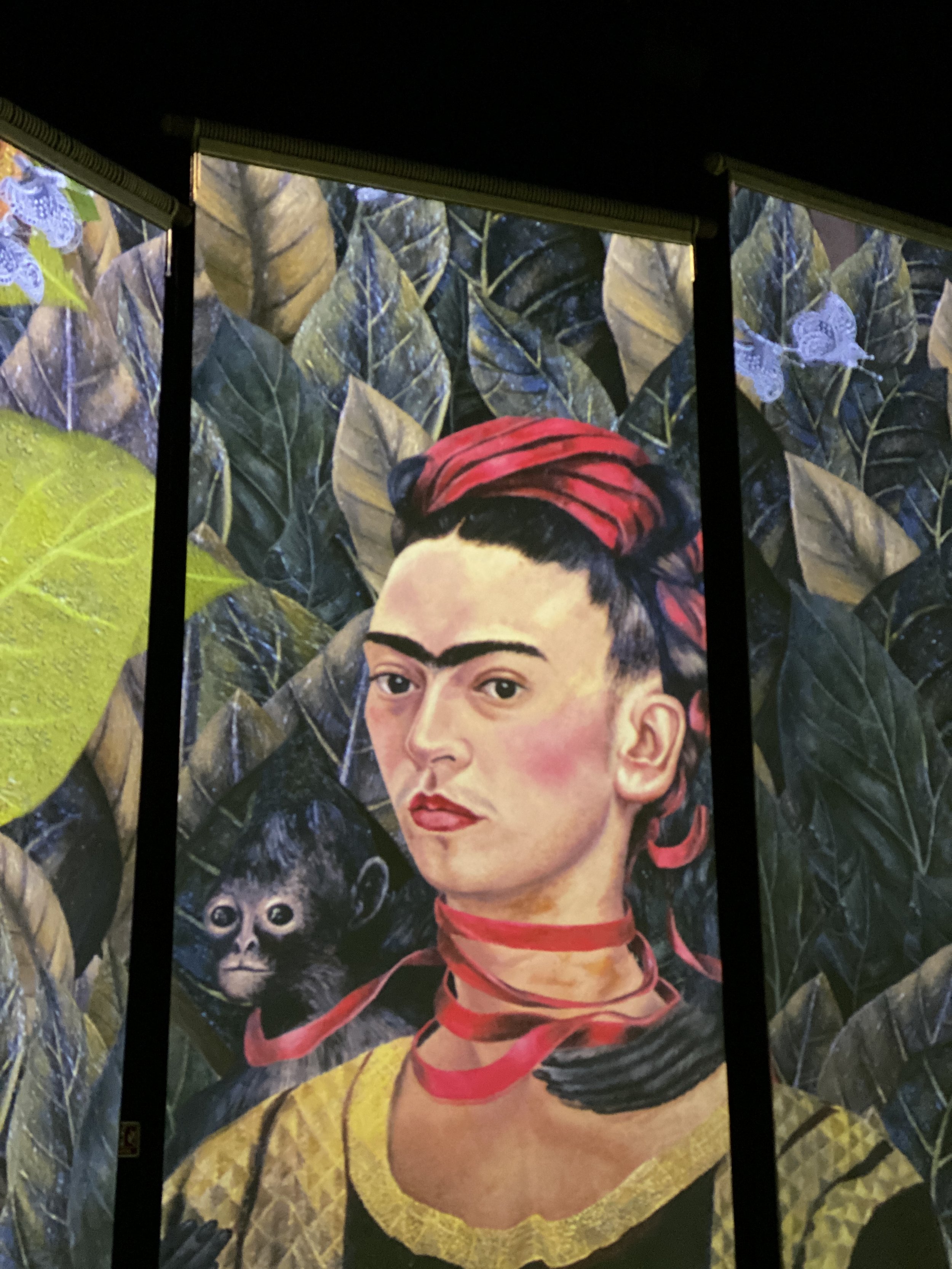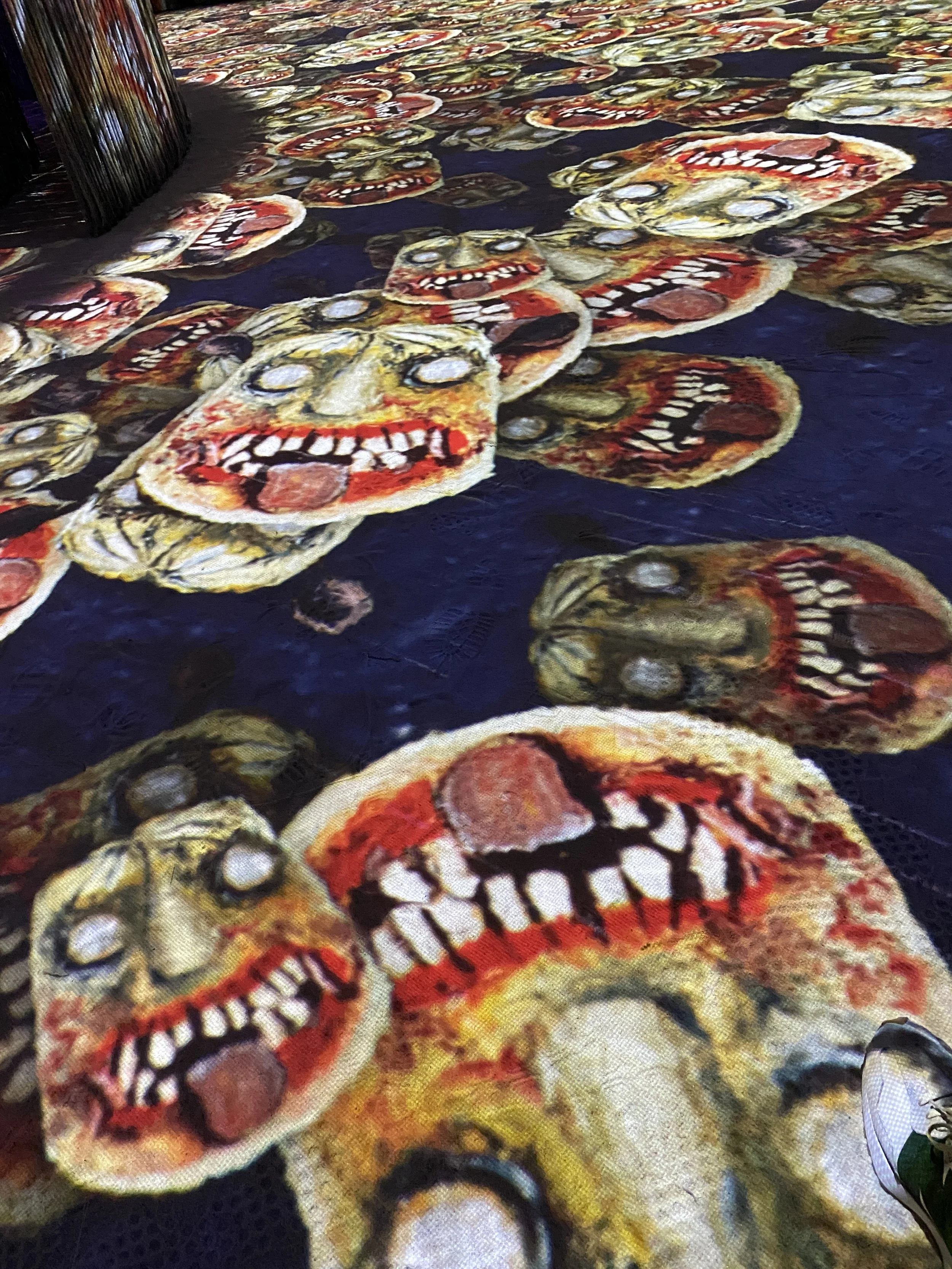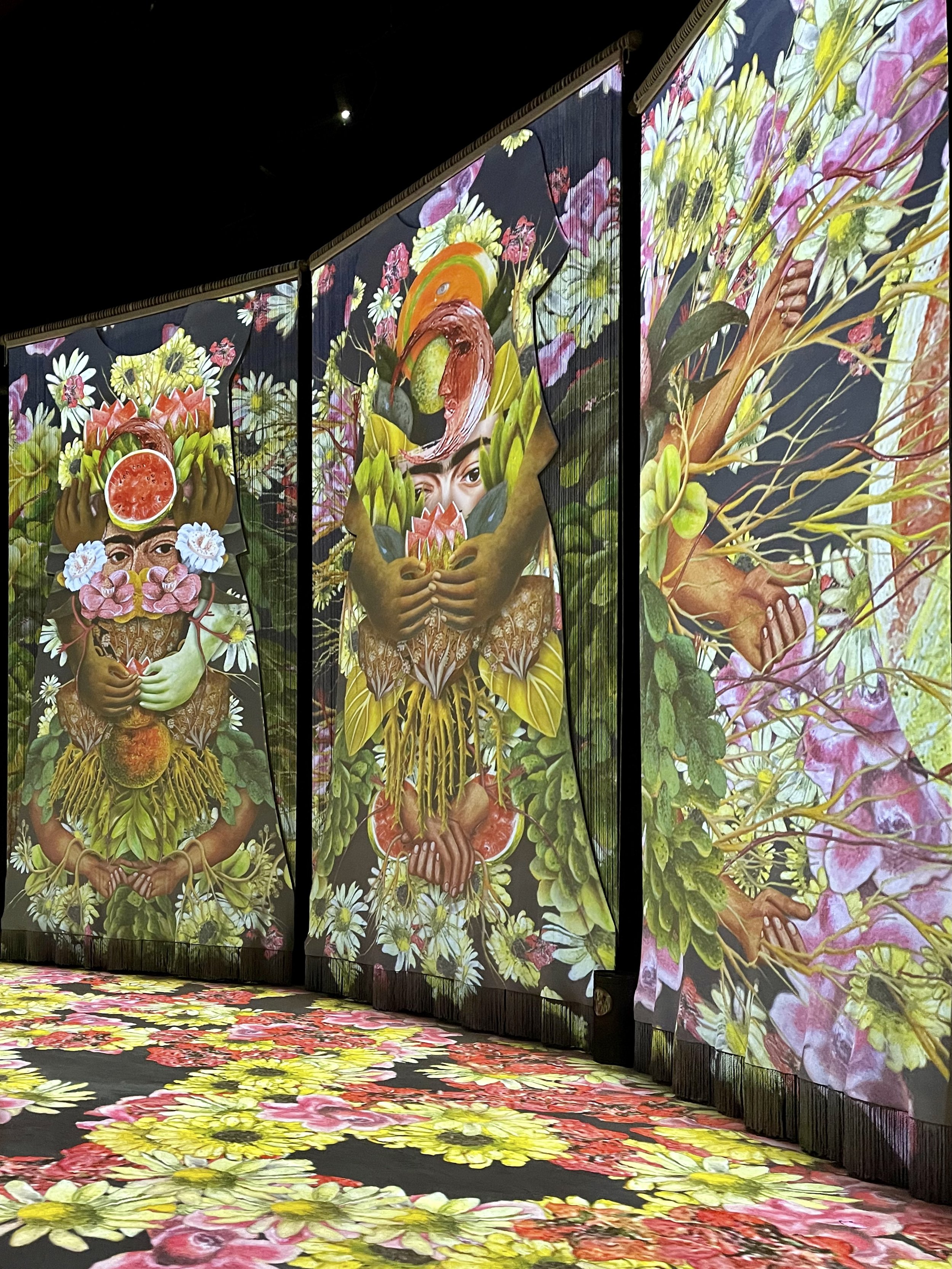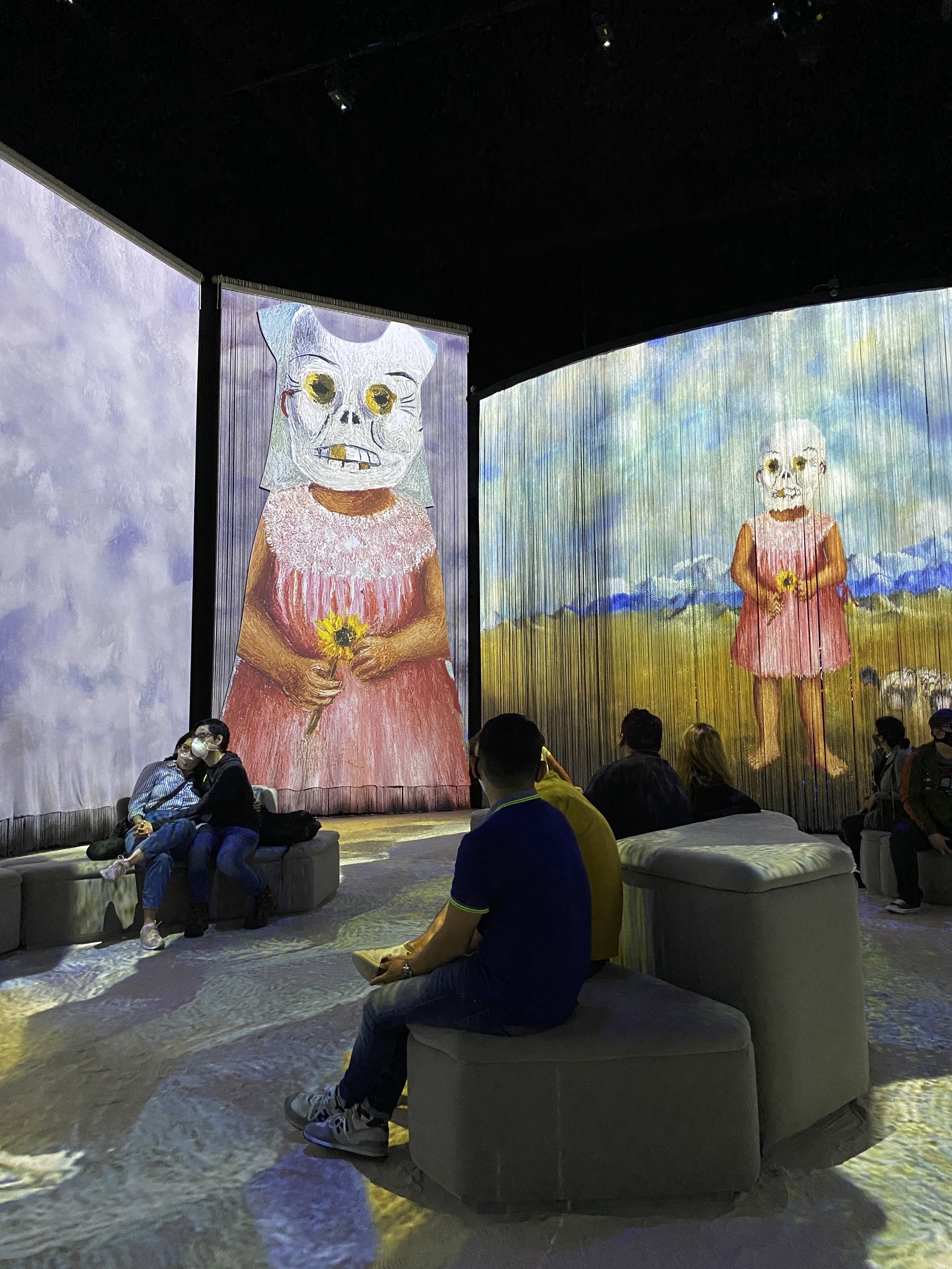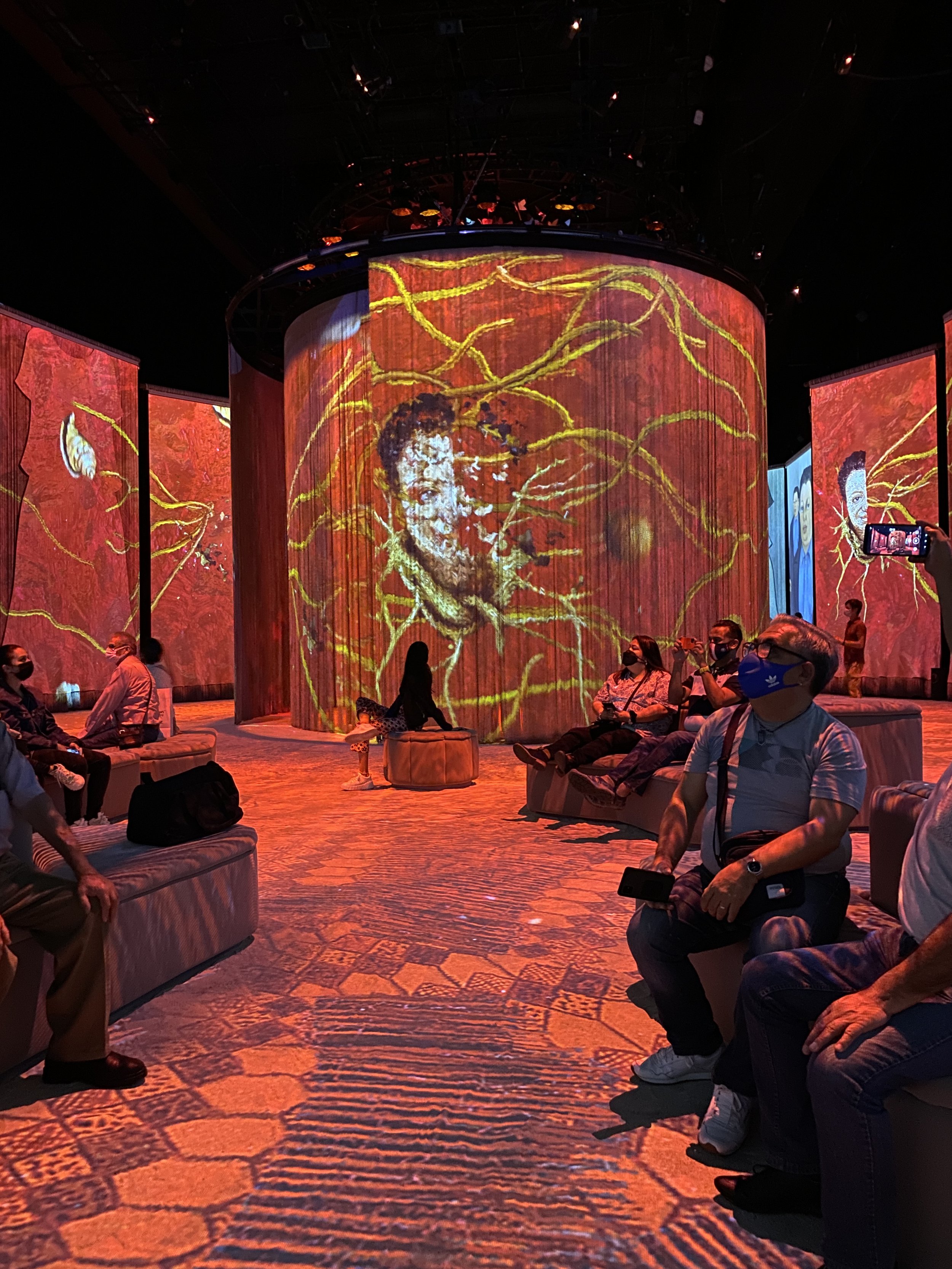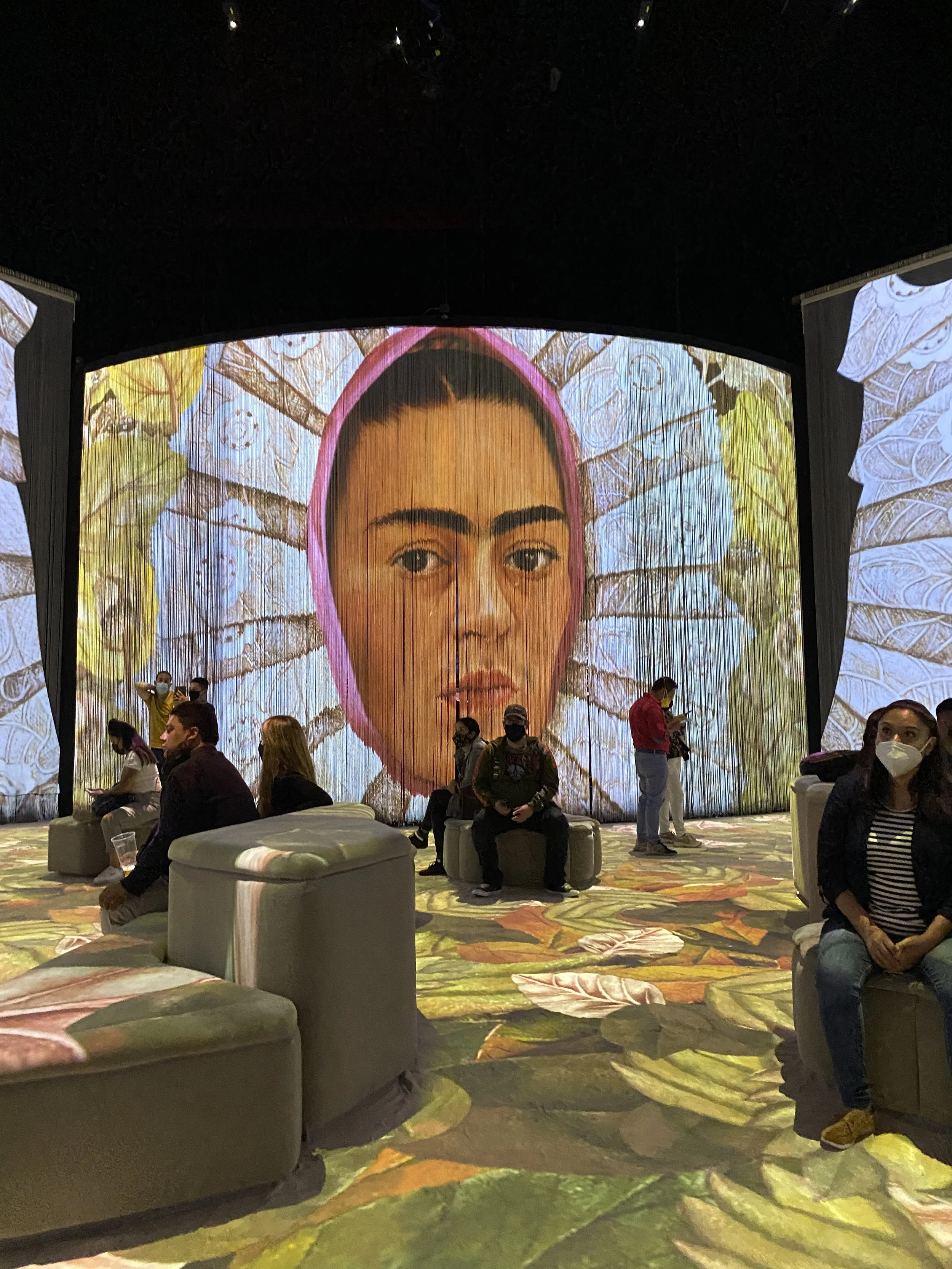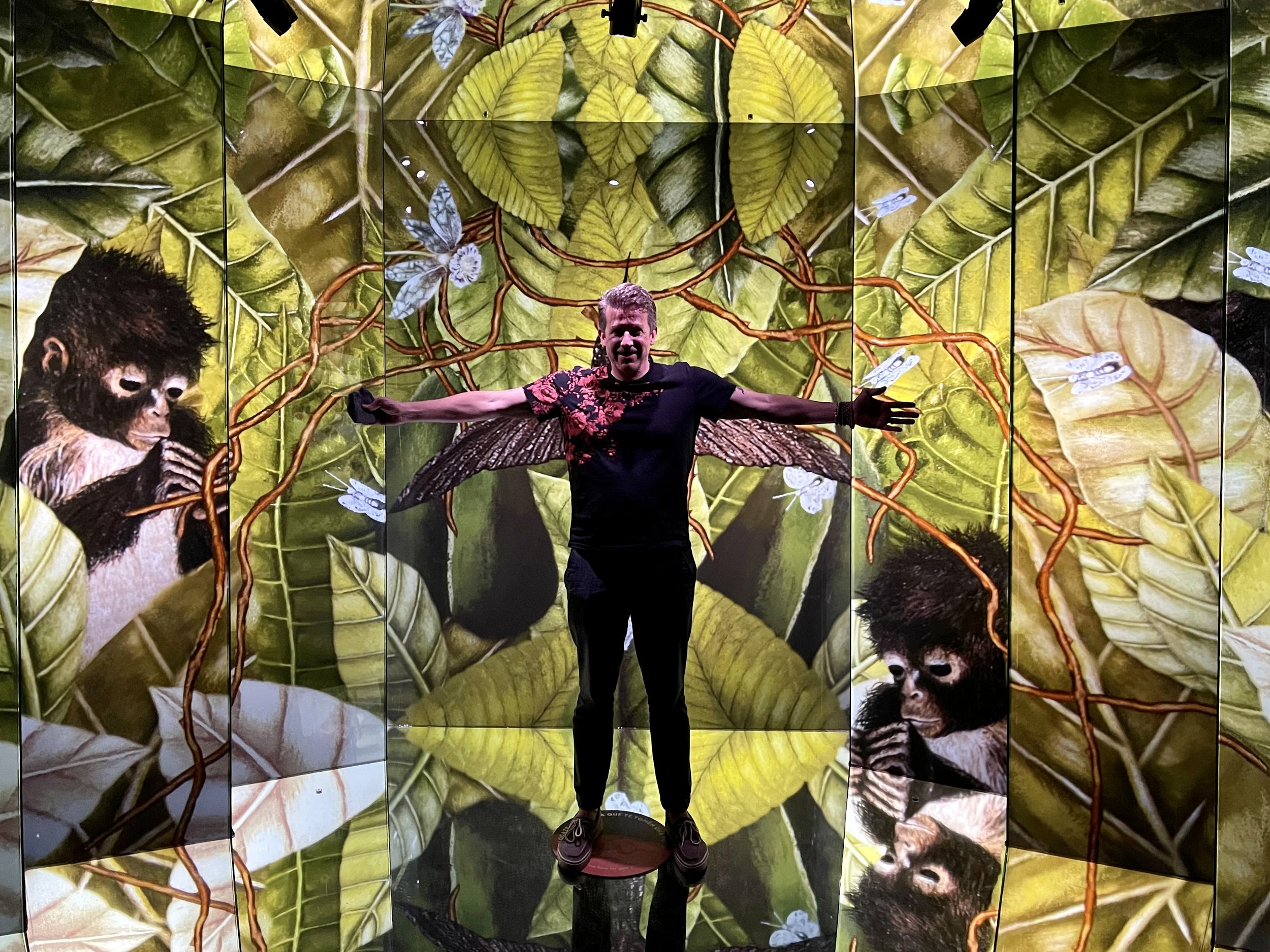Compared to this amazing spectacle honoring the life and work of Frida Kahlo, the Immersive Van Gogh is a mere screensaver.
If you’re in Mexico City, see Immersive Frida while you can!
We parted the strings of rope as we would a curtain, fittingly, from beneath one of Frida’s long Tehuana skirts, and were instantly transported into a magical world.
Duke and I headed toward an empty round ottoman but we both stopped right as we were about to sit down — the seat appeared to be moving!
After a few seconds, our vision adjusted and we realized it was just a trick of the eye from the projected patterns that filled the walls and drifted across the white sand covered floor. We laughed and took a seat.
In the center of the gallery a circle of rope curtains bisected the gallery. These moved periodically, sometimes swirling, sometimes opening to reveal the other half of the exhibit space for dramatic vistas.
Rings of curtain-like ropes open and close to reveal dramatic vistas across the room.
Other rope curtains were placed at either end of the main room, acting as screens for the projections of Frida Kahlo’s paintings.
The show takes place at Frontón México, a large entertainment venue.
The spectacle Duke and I attended was Frida: The Immersive Experience (Frida: la Experiencia Inmersiva) held in Mexico City at Frontón México. This massive building, which once served as a jai lai court from the 1920s until the mid-’90s, reopened after a multimillion-dollar overhaul in 2017 as a multipurpose entertainment venue that includes a casino. It’s right across the street from the Plaza de la República and is a 12-minute walk to the Palacio de Bellas Artes, which we explored after the show.
Duke posing in the lobby
Frida in 360 Degrees
Halfway through Immersive Frida, we decided to get up to discover what it was like in the curtained portion at the center of the room. The ropes spun in circles and it was like walking through a curved passageway with moving walls. Then we were inside the bower, with slashes of light illuminating the space. Above us hung a chandelier of sorts, a cascade of white paper flowers that shifted in color, sometimes glowing light blue or purple, interspersed with dark red lightbulbs dripping like drops of blood.
The chandelier shifts colors throughout the show.
After a bit of time here and wanting to see new perspectives, we emerged and found seats on the other side of the room, where we remained for the rest of the show.
The creators of the exhibit took elements from Frida’s paintings — a bug-eyed jaguar mask from (Girl with Death Mask, 1938), a leaf, an alarm clock and airplane from (Time Flies, 1929), and (The Two Fridas) — cut them out and filled the screen with them. Then parts of famous paintings would peek out from the collage, and you have to constantly look around to see different objects: Diego’s eye here, Frida’s mustache over there, the leg of a deer behind you. There’s nonstop movement and animation, and even voice recordings of Frida herself, waxing poetic about her love for Diego.
Elements of Frida’s paintings are isolated and presented as a moving collage.
Then elements from other paintings reveal themselves, like this one of Diego.
Immersive Frida includes some audio footage of the artist speaking.
Frida’s famous paintings truly come to life.
You’ve got to constantly look in all directions during the show — there’s something new to see everywhere you look.
A somber set of images, like the ones about the spinal injury that plagued the iconic artist most of her life, were accompanied by intense, moody music. At one point, Frida’s chest opened and a corset wove itself around her shoulders and torso to reveal a broken column within. But then the images would turn bright, as when nature scenes began to populate, and the music became optimistic, energetic, paired with happier imagery.
A terrible accident Frida suffered as a youth informed many of her paintings.
One segment of the exhibit features nature scenes.
At the end of the show, be sure to explore both ends of the room. Beyond the curtains on the side you enter, there are two cool photo opps with elements from the show, along with a long monitor where you can write and have your scribblings show up as colored streaks. Through the ropes at the other end of the exhibit space are a line of interactive stations where crazy creatures created from aspects of Frida’s paintings react to your movements. The more you dance around, flail your arms and jump, the more fun it is to watch the character on screen mimic you.
The photo opps at the end of the show are worthwhile.
A series of interactive exhibits put a fun end to the amazing show.
We’ve seen the Immersive Van Gogh in Chicago. While it’s cool in its way, it struck us as one-note; the media felt more static and didn’t evoke much emotion. To be honest, even the interactive moments after the Frida show were more enjoyable than the $50 we shelled out for Van Gogh. And for only $17 a ticket, Immersive Frida is a steal.
It’s obvious the curators and creators of the show loved their job and greatly respect Frida’s legacy— that appreciation and dedication shine through every moment of the 45-minute spectacle. If you couldn’t already tell, we highly recommend going. If we lived in Mexico City, or if the show makes its way to Chicago, we would certainly come again. Immersive Frida is so rich in imagery, and, as we had to spin around constantly and crane our necks to catch all the different views, we know that inevitably there was much we missed the first time. –Wally

